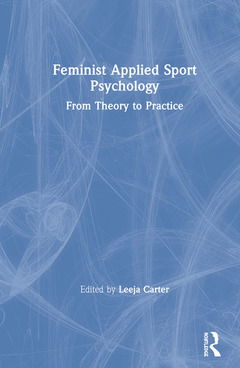Feminist Applied Sport Psychology From Theory to Practice
Coordonnateur : Carter Leeja

With an emphasis on women and transwomen athletes and exercisers of color, Feminist Applied Sport Psychology: From Theory to Practice introduces the reader to feminist, black feminist, and womanist sport psychology, offering an alternative and powerful approach to working with athletes.
Covering core concepts, applied skills, and research methods, the book includes useful features throughout, such as discussion questions and definitions of key terms. It is organized into three sections covering, firstly, feminist theory, history, movements, and their importance in applied sport psychology; secondly, the intersection of race, class, and gender, and the integration of intersectional considerations into sport psychology; and finally, in-depth case studies of feminist sport psychology in action, each of which offers strategies for best practice.
Feminist Applied Sport Psychology: From Theory to Practice is important reading for feminist-centred students and practitioners in performance and sports domains, and exercise psychology and anybody with an interest in feminist approaches to working with women of diverse backgrounds.
Introduction
SECTION I: Feminist Applied Sport Psychology
1. What is Feminism: Where Have We Been and Where Are We Going?
2. History of Feminist Sport Psychology
3. Yes, I Am a Feminist: My Interwoven Journey in Sport and Feminism
4. Feminist Sport Psychology Ethics
5. Feminist and Sport Research Methods
Section II: More Than Gender
6. Black Feminist Thought: Contextualizing Black Women’s Sporting Experiences
7. Race, Class and Gender: Intersectionality in Sport
8. Mandating Intersectionality in Sport Psychology: Centering LGBTQ Women of Color Athletes
Section III: Essays on Practice and Research
9. "Is This Where We Tell Our Stories": Exploring Black Women’s Health Experiences Through Storytelling
10. Asian Americans: The Other White Meat? Vacillating Identities and Asian American Women in Sport
11. A Story of Partnership Built on Indigenous and Feminist Epistemologies and Community-Based Participatory Research
12. A Life of Paradoxes: Transwomen of Color in Sport
13. This Girl Can Fight
14. Women of Color in the Box—Safe Spaces in CrossFit and HIIT
15. Teaching as Transgression: The Meta-autoethnography of a Fat, Disabled, Brown Kinesiology Professor
16. Healing Old Wounds and Imagining New Futures: Feminist Reflections From a Straight, White Cisman in Sport Psychology
17. The Unintentional Feminist
18. Recognizing I’m the Elephant in the Room: Whiteness, Feminism and Working with Women of Color
19. Breaking Stereotypes and Barriers to Working with Muslim and Women of Color
20. Doing Feminist Sport Psychology: Implications and A Call to Action
Leeja Carter is Director of the Performance Excellence in Applied Kinesiology (PEAK) Program and Assistant Professor in the School of Health Professions at Long Island University – Brooklyn (LIU), USA. Dr. Carter is a Fulbright Scholar, author, and writer who currently serves as the Association for Applied Sport Psychology (AASP)'s Interim Diversity and Inclusion Executive Board Division Head and the Women in Sports special interest group coordinator and has previously served as AASP Diversity Committee Chairperson. She sits on Long Island University – Brooklyn's Gender Studies Board and is a member of the American Psychology Association's Division 47: Society for Sport, Exercise, and Performance Psychology, Division 45: Society for the Psychological Study of Culture, Ethnicity, and Race, and Division 35: Society for the Psychology of Women.
Date de parution : 07-2019
15.6x23.4 cm
Date de parution : 07-2019
15.6x23.4 cm
Thèmes de Feminist Applied Sport Psychology :
Mots-clés :
ACL Injury; Feminist Sport Psychology; Negative Behavioral Health Outcomes; Feminist Psychology; Life Skill Counselor; Sport and Gender; Institutional Review Board; Sport; Race and Ethnicity; Group Fitness Classes; Feminist; Sport Psychology; Black Feminist; Color Blind Race Ideology; Womanist; White Racial Frame; Working with Athletes; Cultural Sport Psychology; Applied Sport Psychology; Feminist Approaches; Applied Sport Psychology Practice; Working with Women of Color; Fallon Fox; Feminist Theory; Shape America; Feminist Perspectives; Field Hockey; Feminist Ethics; Women’s Physical Education; Black Feminism and Womanism; Black Female Athletes; Women Athletes; Model Minority Myth; LBTQ Women of Color in Sport; Fighting Sports; transwomen athletes; Sport Psychology Professionals; Feminist Sport History; LBTQ women; CBPR; Sport Psychology Practitioners; Black feminism; Fourth Wave Feminism; Performative Allyship; Native Community Partners



